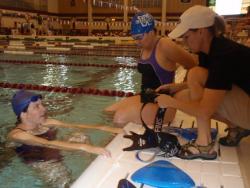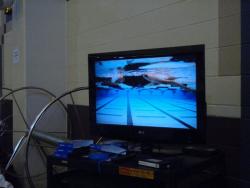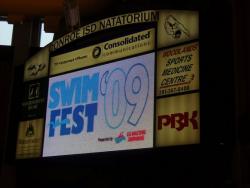From Outsider to Part of the Family
Swim Fest provides a path for new USMS employee
I recently graduated from college. I have never been involved with Masters swimming. I was offered the opportunity to attend SwimFest and I accepted with what I thought was an open mind. I learned very quickly that what I thought was an open mind was still clouded with my assumption of what Masters swimming and Masters swimmers were all about. My preconceived ideas were quickly washed away as I saw swimmers ranging in age from late 20s to late 70s. Everyone was participating, not because a parent suggested that they do so and not because a coach told them it was time to jump in. The participants at SwimFest were there because they wanted to be. Most people don't have a choice about going to work in the morning and very few people can choose whether or not to pick up the kids from soccer, however each of the adults that I saw participating at this first annual event were there because they made the decision to rearrange their schedules, find a sitter for the kids, travel to Shenandoah, Texas and swim, for fun, with 100 other athletes and 40 plus coaches. Nearly everyone at SwimFest came from a different background, led a unique life and told different stories. Some had swum in college. Some had swum in high school. Some had just started swimming recently. Some were competitive. Some not. Despite each participant's unique motivation for swimming and attending SwimFest, every single swimmer and coach shared a common love of the water.
Friday night, the first night of the three-day clinic, was reserved for a coaches' round table discussion. Seven respected and well-known Masters coaches from around the country sat in front of a room full of 40 plus, eager-to-learn, Masters coaches and answered questions. They shared stories of how they developed their own programs, the problems they had encountered along the way and how they solved them, coaching tips and drills, and they discussed other topics such as collecting dues and building relationships with local facility managers. As soon as the discussion began, Rob Butcher, Executive Director of U.S. Masters Swimming, looked at me and said, "Are you getting all of this?!" It seemed a shame to him and I, both, that only the coaches in the room were going to have access to this information, so, feverishly, I started taking notes. At the end of the evening we polished up our notes and posted the lessons learned on www.usms.org so that everyone would have the opportunity to learn from the round table.
 Saturday morning marked the first day of the swimming clinic. To fully understand the clinic, which was only 24-hours in and already a success, I pulled on my suit and got into the pool. By doing so, I had the opportunity to hear what the other swimmers had to say about the clinic, coaching and operations of the event as it was happening. Their attitudes were incredible. The water may have been a little cold, but I did not hear a single complaint. Everyone was focused on the coaches and the coaches' direction, correction and explanations. I moved around from station to station, hitting some of them twice. Some stations were focused on dryland exercises while others focused on in-water stroke drills. Remarkably, the intensity of the exercise and information presented was consistent across all of the coaches and each of the stations. Each swimmer was coached as an individual and received personal attention at each station. While in the water, I asked a few of the swimmers, "How do you like each of the coaches?" Some replied that it was refreshing that all of the coaches shared a similar passion for the sport and for coaching, but each of the coaches applied their individual style to the drill or station. I have been a swimmer for 14 years. I understand "repetitive" and "boring," and even "dull," but the feedback that I heard from the Masters swimmers at SwimFest was the opposite.
Saturday morning marked the first day of the swimming clinic. To fully understand the clinic, which was only 24-hours in and already a success, I pulled on my suit and got into the pool. By doing so, I had the opportunity to hear what the other swimmers had to say about the clinic, coaching and operations of the event as it was happening. Their attitudes were incredible. The water may have been a little cold, but I did not hear a single complaint. Everyone was focused on the coaches and the coaches' direction, correction and explanations. I moved around from station to station, hitting some of them twice. Some stations were focused on dryland exercises while others focused on in-water stroke drills. Remarkably, the intensity of the exercise and information presented was consistent across all of the coaches and each of the stations. Each swimmer was coached as an individual and received personal attention at each station. While in the water, I asked a few of the swimmers, "How do you like each of the coaches?" Some replied that it was refreshing that all of the coaches shared a similar passion for the sport and for coaching, but each of the coaches applied their individual style to the drill or station. I have been a swimmer for 14 years. I understand "repetitive" and "boring," and even "dull," but the feedback that I heard from the Masters swimmers at SwimFest was the opposite.
 Videotaping was also available to participants. Being a Division I scholarship swimmer at an SEC school, I confidently got in line to be filmed. I thought, "I have swum with one of the toughest coaches in the country and I have swum at the highest level in the United States, I doubt that this Masters coach will find too much to critique." Again, I was wrong. Mike Collins videotaped me, offered suggestions and saw things in my stroke no one had seen before. For me, the filming station proved to be most beneficial and eye opening.
Videotaping was also available to participants. Being a Division I scholarship swimmer at an SEC school, I confidently got in line to be filmed. I thought, "I have swum with one of the toughest coaches in the country and I have swum at the highest level in the United States, I doubt that this Masters coach will find too much to critique." Again, I was wrong. Mike Collins videotaped me, offered suggestions and saw things in my stroke no one had seen before. For me, the filming station proved to be most beneficial and eye opening.
By Sunday morning I felt as though I had been educated on U.S. Masters Swimming. I had learned that Masters swimmers enjoy what they are doing, that Masters coaches not only know their stuff but are willing to work with any and everyone to better their stroke and performance in the water. Sunday morning I woke up ready to experience the third and final day of SwimFest: the open water clinic. Open water has become and will continue to be a popular sport amongst swimming enthusiasts and U.S. Masters Swimming is working hard to promote its benefits and appeal. On Sunday, I saw many of the visiting coaches feverishly taking notes as the mentor coaches explained open water drills to be executed in the pool. The mentor coaches explained drills and various techniques to train in a pool setting that can be translated into the open water. I could see light bulbs flashing above the heads of the coaches on deck as well as over the heads of the swimmers in the water. No matter the age or expertise level of the swimmers and coaches, everyone learned something from the open water clinic.
 For the longest time I thought that swimming in college would be the pinnacle of my swimming career and, upon its completion, I wouldn't have much to look forward to, at least in the pool. However, last weekend I stepped into a whole new world. Not only is there more swimming to be done after college, but it can also be fun. SwimFest helped me to see my future in this sport. I will continue to swim. I will get involved with U.S. Masters Swimming. I will meet new friends, work with new coaches and I will enjoy every minute of it.
For the longest time I thought that swimming in college would be the pinnacle of my swimming career and, upon its completion, I wouldn't have much to look forward to, at least in the pool. However, last weekend I stepped into a whole new world. Not only is there more swimming to be done after college, but it can also be fun. SwimFest helped me to see my future in this sport. I will continue to swim. I will get involved with U.S. Masters Swimming. I will meet new friends, work with new coaches and I will enjoy every minute of it.
As a self-proclaimed outsider a week ago, I now consider myself part of the U.S. Masters Swimming family and I look forward to next year's SwimFest.
This article was written by Kyle Deery, a graduate of the University of Florida. Kyle swam with Coach Troy from 2003-2008 during which time he swam breaststroke and individual medley events.
Categories:
- Technique and Training
- Events
- Coaches Only














